Brill Greek Reference Collection (5 vols.)
Digital Logos Edition
Overview
Greek is among the most widely studied languages today. Recent discoveries, however, have provided new insights into some of our long-standing knowledge of ancient Greek.
The Brill Greek Reference Collection keeps you up to date with recent inquiries into how ancient Greek developed. Explore the latest research on the linguistic aspects of ancient Greek ranging from Proto-Greek to Koine, and analyze the etymology of the ancient Greek words in their earliest use. This is a must-have research tool not only for every classicist, but also for anyone interested in ancient Greek.
Interested in discourse features and devices of the Greek New Testament? Check out the Lexham Discourse Greek New Testament Bundle (6 vols.).

- Explores the latest research on ancient Greek
- Accesses a wide range of topics in ancient Greek linguistics
- Provides new insight into some of the long-standing knowledge of ancient Greek
- Title: Brill Greek Reference Collection
- Publisher: Brill
- Volumes: 5
- Pages: 3,654
- Resource Type: Encylopedias, Reference
- Topic: Greek Reference
- Encyclopedia of Ancient Greek Language and Linguistics, Vol. 1 edited by Georgios K. Giannakis
- Encyclopedia of Ancient Greek Language and Linguistics, Vol. 2 edited by Georgios K. Giannakis
- Encyclopedia of Ancient Greek Language and Linguistics, Vol. 3 edited by Georgios K. Giannakis
- Etymological Dictionary of Greek, Vol 1 by Robert Beekes
- Etymological Dictionary of Greek, Vol. 2 by Robert Beekes
This title is included in the following collections
You can save when you purchase this product as part of a collection.
Brill Greek and Hebrew Referen...
$1,939.96$1,549.99
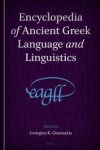
The Encyclopedia of Ancient Greek Language and Linguistics (EAGLL) brings together the latest research from across a range of disciplines that contributes to our knowledge of ancient Greek. It offers a systematic and comprehensive treatment of all aspects of the history and study of ancient Greek, and comprises detailed descriptions of the language from Proto-Greek to Koine. It addresses linguistic aspects from several perspectives, including history, structure, individual singularities, biographical references, schools of thought, technical meta-language, sociolinguistic issues, dialects, didactics, translation practices, generic issues, and Greek in relation to other languages. It also addresses linguistic aspects on all levels of analysis, including phonetics, phonology, morphology, syntax, lexicon, semantics, and stylistics. It includes all the necessary background information regarding the roots of Greek in Indo-European. Excursions may be made to later stages of the language, such as Byzantine or even later, but the focus will be predominantly ancient Greek.
With well over 500 entries on all aspects of ancient Greek, EAGLL is a unique work that brings together the latest research from across a range of disciplines which contributes to our knowledge of ancient Greek. It is an indispensable research tool and the authoritative reference work for scholars, researchers, and students of ancient Greek, general linguistics, Indo-European languages, and biblical literature. Volume 1 covers articles on A–F.
Georgios K. Giannakis is the author of several books including Studies in the Syntax and the Semantics of the Reduplicated Presents of Homeric Greek and Indo-European, The Indo-Europeans. Part I: Language and Culture , Historical Linguistics and Philology, and numerous articles in historical and comparative linguistics and culture. He prepared Greek editions of A.L. Sihler’s New Comparative Grammar of Greek and Latin, M.L. West’s Indo-European Poetry and Myth, and edited a number of collective works including Ancient Macedonia: Language, History, Culture.
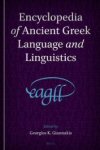
The Encyclopedia of Ancient Greek Language and Linguistics (EAGLL) brings together the latest research from across a range of disciplines that contributes to our knowledge of ancient Greek. It offers a systematic and comprehensive treatment of all aspects of the history and study of ancient Greek, and comprises detailed descriptions of the language from Proto-Greek to Koine. It addresses linguistic aspects from several perspectives, including history, structure, individual singularities, biographical references, schools of thought, technical meta-language, sociolinguistic issues, dialects, didactics, translation practices, generic issues, and Greek in relation to other languages. It also addresses linguistic aspects on all levels of analysis, including phonetics, phonology, morphology, syntax, lexicon, semantics, and stylistics. It includes all the necessary background information regarding the roots of Greek in Indo-European. Excursions may be made to later stages of the language, such as Byzantine or even later, but the focus will be predominantly ancient Greek.
With well over 500 entries on all aspects of ancient Greek, EAGLL is a unique work that brings together the latest research from across a range of disciplines which contributes to our knowledge of ancient Greek. It is an indispensable research tool and the authoritative reference work for scholars, researchers, and students of ancient Greek, general linguistics, Indo-European languages, and biblical literature. Volume 2 covers articles on G–O.
Georgios K. Giannakis is the author of several books including Studies in the Syntax and the Semantics of the Reduplicated Presents of Homeric Greek and Indo-European, The Indo-Europeans. Part I: Language and Culture , Historical Linguistics and Philology, and numerous articles in historical and comparative linguistics and culture. He prepared Greek editions of A.L. Sihler’s New Comparative Grammar of Greek and Latin, M.L. West’s Indo-European Poetry and Myth, and edited a number of collective works including Ancient Macedonia: Language, History, Culture.
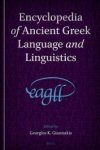
The Encyclopedia of Ancient Greek Language and Linguistics (EAGLL) brings together the latest research from across a range of disciplines that contributes to our knowledge of ancient Greek. It offers a systematic and comprehensive treatment of all aspects of the history and study of ancient Greek, and comprises detailed descriptions of the language from Proto-Greek to Koine. It addresses linguistic aspects from several perspectives, including history, structure, individual singularities, biographical references, schools of thought, technical meta-language, sociolinguistic issues, dialects, didactics, translation practices, generic issues, and Greek in relation to other languages. It also addresses linguistic aspects on all levels of analysis, including phonetics, phonology, morphology, syntax, lexicon, semantics, and stylistics. It includes all the necessary background information regarding the roots of Greek in Indo-European. Excursions may be made to later stages of the language, such as Byzantine or even later, but the focus will be predominantly ancient Greek.
With well over 500 entries on all aspects of ancient Greek, EAGLL is a unique work that brings together the latest research from across a range of disciplines which contributes to our knowledge of ancient Greek. It is an indispensable research tool and the authoritative reference work for scholars, researchers, and students of ancient Greek, general linguistics, Indo-European languages, and biblical literature. Volume 3 covers articles on P–Z, and includes the index.
Georgios K. Giannakis is the author of several books including Studies in the Syntax and the Semantics of the Reduplicated Presents of Homeric Greek and Indo-European, The Indo-Europeans. Part I: Language and Culture , Historical Linguistics and Philology, and numerous articles in historical and comparative linguistics and culture. He prepared Greek editions of A.L. Sihler’s New Comparative Grammar of Greek and Latin, M.L. West’s Indo-European Poetry and Myth, and edited a number of collective works including Ancient Macedonia: Language, History, Culture.
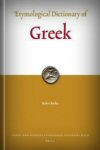
Since the publication of the last etymological dictionary of Greek, both the reconstruction of Proto-Indo-European and our knowledge of the Greek substrate have led to numerous, and often surprising, new insights into the history and formation of the Greek vocabulary.
The Etymological Dictionary of Greek is the first comprehensive etymological dictionary of Greek in the English language. It is a treasure trove covering 2,000 years of ancient Greek from Mycenaean via Homer and the classical period to lexicographers, such as Hesychius (fifth century AD). It consists of 7,500 entries with thoroughly revised etymologies. Each entry gives clear information about the origin of the Greek word and its first date of attestation. It further provides all etymologically relevant variants, dialectal forms, derivatives, compounds, and bibliographical references.
This etymological dictionary is a truly indispensable tool for those in search of a deeper knowledge of the Greek vocabulary, its history, and a better understanding of the language.
Robert Beekes is Professor Emeritus of Comparative Indo-European Linguistics at Leiden University. He has published extensively on the historical grammar of Greek, Iranian, and Indo-European, including The Development of the Proto-Indo-European Laryngeals in Greek, The Origins of the Indo-European Nominal Inflection, A Grammar of Gatha-Avestan, and Comparative Indo-European Linguistics: An Introduction.
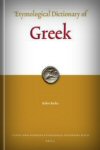
Since the publication of the last etymological dictionary of Greek, both the reconstruction of Proto-Indo-European and our knowledge of the Greek substrate have led to numerous, and often surprising, new insights into the history and formation of the Greek vocabulary.
The Etymological Dictionary of Greek is the first comprehensive etymological dictionary of Greek in the English language. It is a treasure trove covering 2,000 years of ancient Greek from Mycenaean via Homer and the classical period to lexicographers, such as Hesychius (fifth century AD). It consists of 7,500 entries with thoroughly revised etymologies. Each entry gives clear information about the origin of the Greek word and its first date of attestation. It further provides all etymologically relevant variants, dialectal forms, derivatives, compounds, and bibliographical references.
This etymological dictionary is a truly indispensable tool for those in search of a deeper knowledge of the Greek vocabulary, its history, and a better understanding of the language.
Robert Beekes is Professor Emeritus of Comparative Indo-European Linguistics at Leiden University. He has published extensively on the historical grammar of Greek, Iranian, and Indo-European, including The Development of the Proto-Indo-European Laryngeals in Greek, The Origins of the Indo-European Nominal Inflection, A Grammar of Gatha-Avestan, and Comparative Indo-European Linguistics: An Introduction.
Reviews
2 ratings

Matt Hamrick
3/15/2024

Forrest Cole
11/9/2021